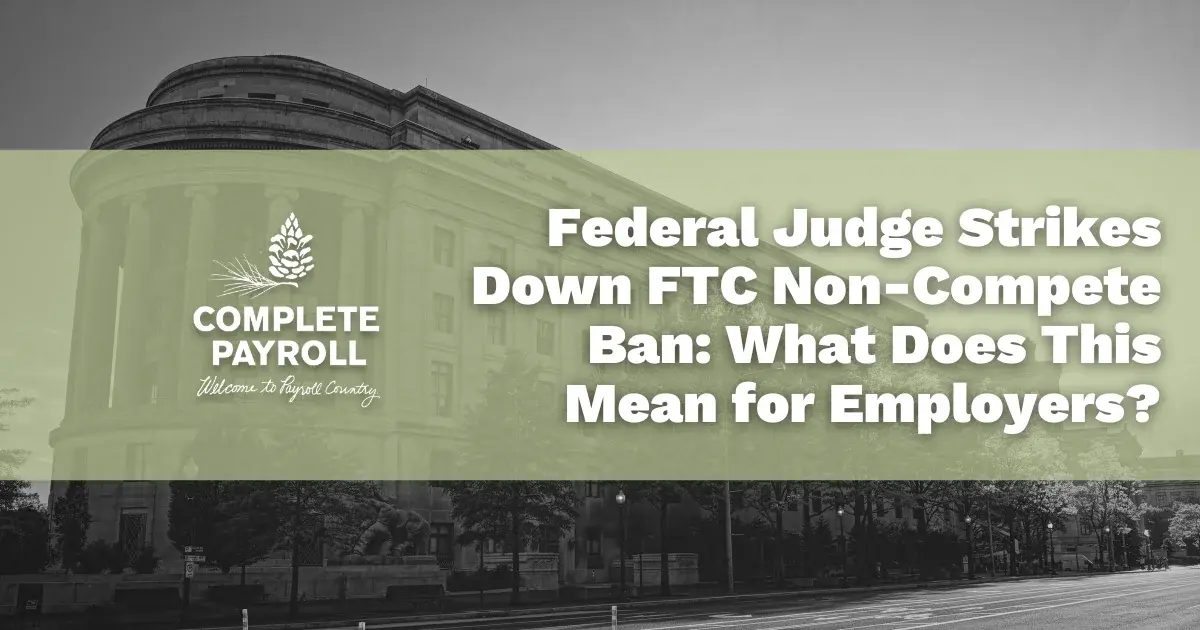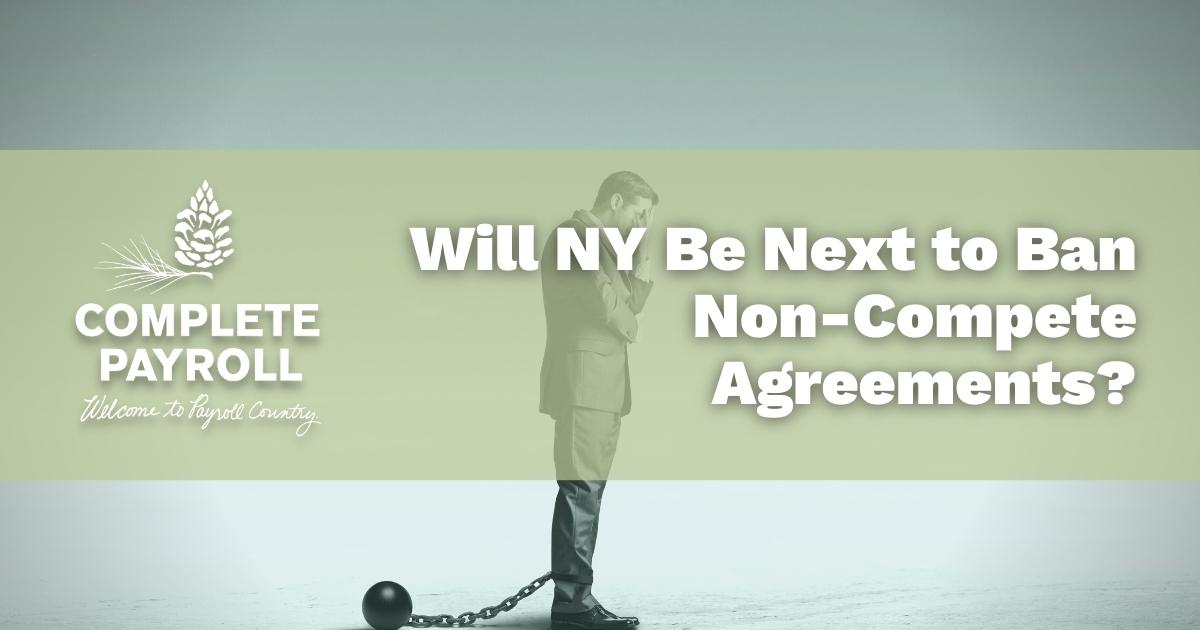FTC Implements Nationwide Ban on Noncompete Agreements
Written by Rick Fish, Jr., C.P.P.

UPDATE: On August 20, 2024, Federal Texas Judge Ada E. Brown found the ruling to be unlawful and blocked the FTC’s proposed federal non-compete rule. Read our updated post to learn more.
On April 23, 2024, the Federal Trade Commission made a huge announcement that will greatly impact companies across America. The Federal Trade Commission (FTC) announced its decision to ban non-compete clauses nationwide.
The Federal Trade Commission's decision to ban non-compete clauses comes with the premise that it is an unfair method of competition. This ban is intended to encourage employee mobility, freedom, creativity, increase competition, and encourage new startups and ideas. This ban is expected to have a positive impact on our economy, with a major increase in innovation, higher earnings, new patents, and thousands of new businesses forming every year.
For employers who are worried about protecting their businesses' intelligence information, there are still effective ways for employers to protect their intellectual property while being compliant with the non-compete ban.
FTC Non-Compete Rule
This new FTC rule will not only prohibit future non-compete clauses but also dissolve current non-complete bans that are in place.
Before we dive into how the federal ban on non-competes will affect businesses and employees, let’s define what a non-compete agreement is. A non-compete clause is a legally binding agreement that either prohibits, penalizes, or prevents employees from seeking or accepting work in the same field for a specific amount of time after leaving their current employer. This also includes starting their own competitor's business.
These workplace contract regulations not only dictate how long before an employee can work for a competitor but also specify the geographic region and market, regardless of being terminated or resigned.
Non-compete clauses often hinder employees from taking a new job or starting a new business. In addition to this, they also hinder employees from earning higher wages.
When Does the Non-Compete Ban Take Effect?
The non-compete clause changes will take effect 120 days after the final rule has been published in the Federal Register. The ruling is scheduled to be published on May 7, 2024, meaning the non-compete ban will come into effect on September 4, 2024.
Once this goes into effect, employers are legally obligated to let employees know that their current non-compete clause is now dissolved and ineffective.
Non-Compete Ban Outcomes
How will this federal ban on non-competes affect our economy and the lives of workers?
- The FTC estimates that, as a result of this ban, over the next decade, health care costs will be reduced by between $74 and $94 billion.
- New business growth is estimated to exceed 2.7%, with an increase of 8,500 new startup businesses every year.
- Innovation will rise, with an average of 17,000 and 29,000 or more patents being filed each year. This is due to workers currently not being able to bring new ideas to fruition due to non-compete agreements.
- Lastly, but not least, this ban is estimated to increase wages, with workers seeing an increase of $400–$488 billion in wages over the next decade.
How Does The Non-Compete Ban Impact On Employers?
What does this federal ban on non-compete clauses mean for employers? Employers will need to revise any contracts that include a non-compete agreement in them to remove them and inform the employee they are no longer under a non-compete clause.
For employers who are worried about their privacy and intellectual property, they can have their employees sign a non-disclosure agreement (NDA). These are effective workplace contract regulations that help protect companies' investments, privacy, and sensitive information. In fact, most employees who are currently in a non-compete agreement are also in an NDA.
How Does The Non-Compete Ban Impact On Workers?
The non-compete clause changes are expected to have a positive impact on workers. Employees who didn't have the freedom to shop around for a better job with higher wages are now able to do so easier. Employees who desire to start their own business or file for a patent on a new idea are now able to freely do so without worrying about negative or legal repercussions from their current employer.
Nearly 30 million American workers are currently subject to non-compete agreements. While before, workers were often pressured or forced to stay in a job with low wages or a disagreeable work environment, this ban will give them the freedom and opportunity to find a better job with higher wages, starting immediately. Non-compete clauses often specified a time period employees had to wait before accepting a similar job in the same market.
Who is Exempt From The Non-Compete Ban?
While the FTC is implementing a nationwide ban on non-compete agreements, there is one exception to this rule. Once the ruling goes into effect after the projected date of September 4th, 2024, all new non-compete clauses will be banned, and employers will no longer be able to enforce any existing agreements—except for a small group of people.
The non-compete ban does not apply to existing non-compete agreements with senior executives. These existing agreements can remain in place under the FTC’s final ruling, but there are certain eligibility requirements. Senior executive workers are defined by the FTC as executives who earn more than $151,164 annually, are in policy-making positions, and already have a current non-compete clause.
Employers are banned from attempting to create new non-compete clauses with senior executives who aren’t currently under one. This exception only applies to senior executives who have already entered into this non-compete agreement.
Legal Compliance Guidelines
Obviously, this is a major nationwide change that will affect millions of workers and businesses. Compliance with this new FTC ruling is essential, and business owners and management should make sure they’re informed to ensure legal compliance.
Employers will need to review and potentially revise employment contracts. Employers need to be aware that they must communicate with their employees about this change and notify them that they are no longer under a non-compete agreement. The FTC is providing a suggested model language for conveying this change to employees, which you can view on the FTC website.
Businesses can still protect their intellectual secrets and investments by focusing on alternative agreements, such as a non-disclosure agreement (NDA). Companies can still keep their information private with an NDA while being legally compliant with the new FTC ban. With an NDA, workers can still be respectful and ensure the privacy of their current employer’s sensitive information while being free to seek other employment.
Conclusion
The FTC's new rule banning non-compete agreements signifies a major shift in employment law and enhances worker mobility and freedom. The FTC estimates that this change will boost innovation, overall market competitiveness, and support the betterment of American workers and the economy.
To stay up to date on the FTC non-compete rule, subscribe to Complete Payroll’s newsletter for the latest updates.

















 Get Instant Blog Notifications
Get Instant Blog Notifications

